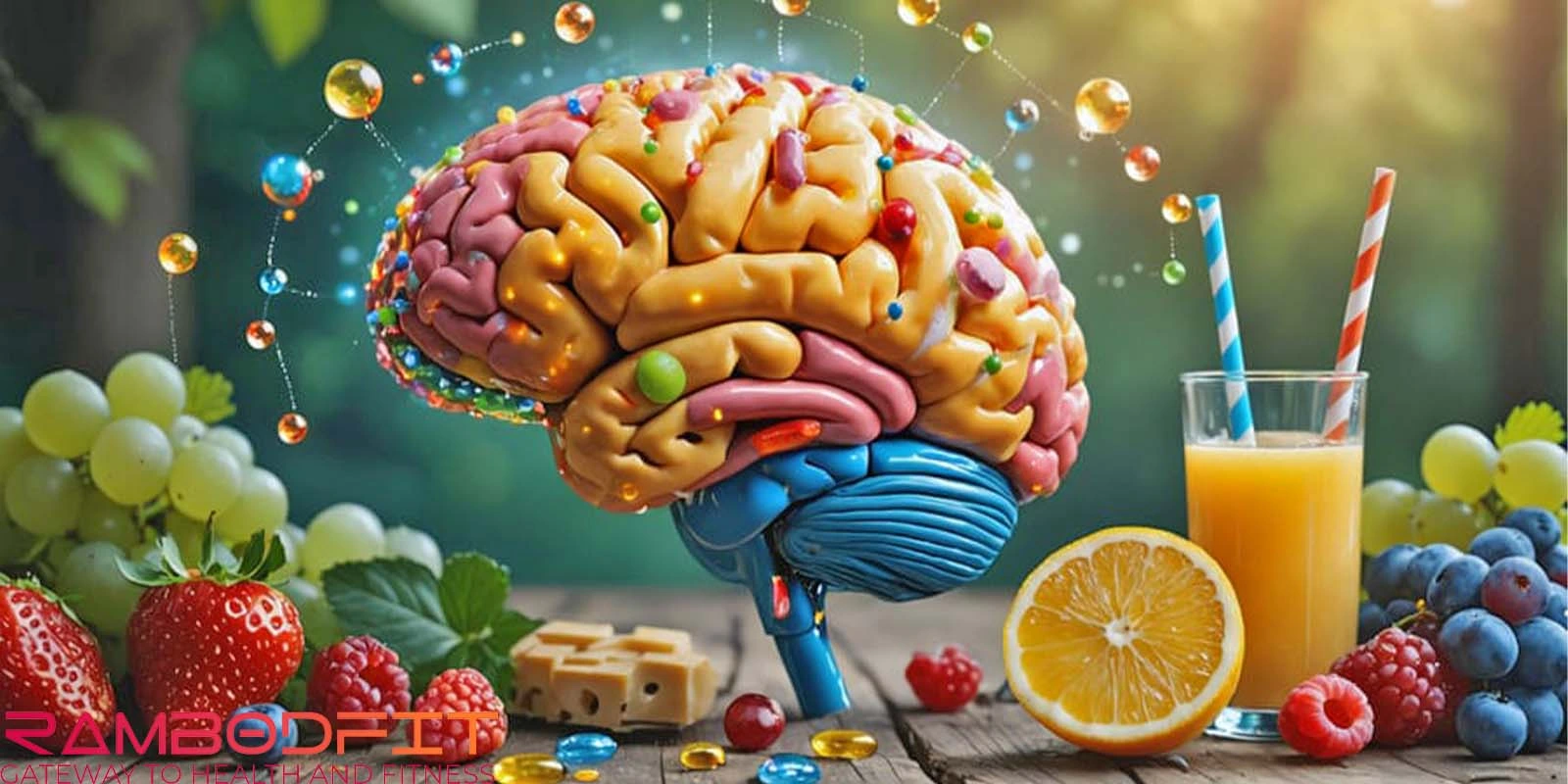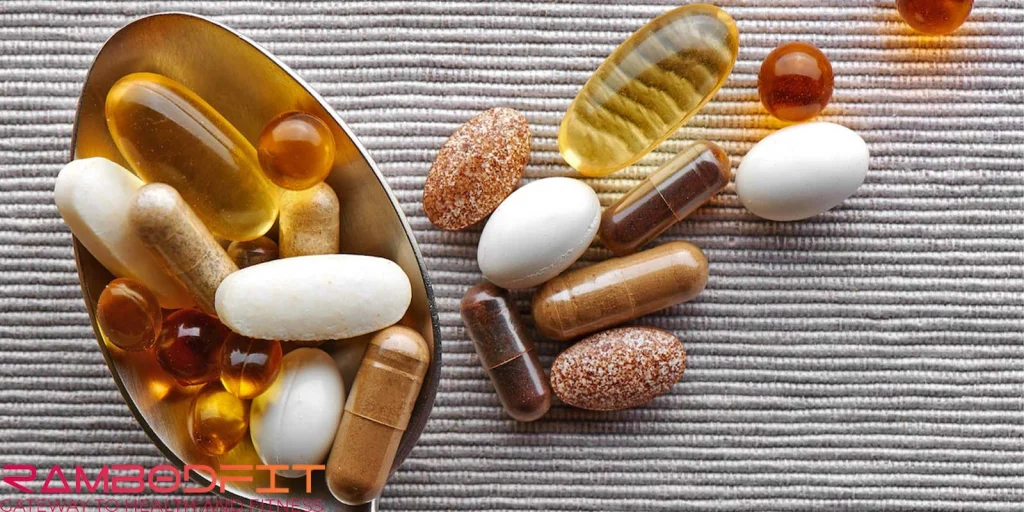


Mental health involves more than psychological factors. Biological needs shape how the brain works. To function well, the brain depends on a constant supply of key nutrients. Best vitamins for mental health support neurotransmitter creation and help the body regulate inflammation and react to stress.
While therapy and exercise stick around as important parts of mental wellness, and mindfulness is still a popular tool, paying attention to nutrition is growing as a way to improve mental health. On Rambodfit, we will talk about the best vitamins for mental health and a good mood.

Research from nutritional psychiatry shows that using specific minerals and the best vitamins for mental health may help ease everyday brain struggles. This article takes a look at some of the most proven nutrients that help with mood, reduce anxiety, and improve focus.
When the best vitamins for mental health or minerals are lacking, they can harm mood, concentration, and emotional strength. Over time, this might lead to symptoms like anxiety, sadness, or unclear thinking that often go unnoticed at first.
Here we focus on the 8 best vitamins for mental health and better function:
Vitamin B12 plays a crucial role in making energy, forming DNA, and producing red blood cells. In the brain, it helps protect the myelin sheath, which covers nerves and helps brain cells stay connected.
Low levels of B12 can cause a wide range of brain and mental health problems. These can include forgetfulness, confusion, mood swings, and feeling low. Because B12 comes from animal-based foods, people who are vegetarians or vegans may have a higher chance of becoming deficient.
Deficiency Symptoms: Feeling tired, trouble focusing, slower mental processing, moodiness, sadness, or tingling in the hands and feet.
Pro Tip: Choose methylcobalamin, which is the ready-to-use form of B12. It helps brain health and passes into the brain better than cyanocobalamin.
Vitamin B6 works like a helper in more than 100 chemical processes in the body. Many of these deal with making neurotransmitters. It helps the body make serotonin, which boosts good feelings. It also helps make dopamine, which connects to motivation and joy, and GABA, which helps promote calmness.
Not having enough B6 has a strong link to depression, anxiety, and symptoms of PMS. It also influences hormone levels and helps the immune system work better.
What to Watch For: Feeling irritable, being confused, trouble sleeping, low mood, and mood swings connected to PMS.
Pro Tip: Try the P-5-P (pyridoxal-5-phosphate) version to absorb it better and to support making neurotransmitters more.
Folate helps fix DNA and supports methylation, which is key to clearing toxins from the brain and making neurotransmitters. Researchers often link low folate levels to memory loss and depression.
It also helps break down homocysteine, a damaging amino acid, into methionine. Methionine is important because it’s used to make serotonin and dopamine.
What a Deficiency Looks Like: Trouble focusing, bad mood, forgetfulness, or feeling annoyed.
Pro Tip: Try methylfolate (5-MTHF) instead of folic acid. This is helpful if someone has MTHFR gene variants, which can make it harder to process folic acid.
People call Vitamin D the “sunshine vitamin,” but it’s a hormone precursor. It has an influence on more than 1,000 genes, some of which play a role in how the brain works. It helps control how serotonin is made and boosts the sensitivity of dopamine receptors.
A lack of Vitamin D often has a connection to issues like depression, fatigue, and seasonal affective disorder. Over time, its anti-inflammatory effects help protect the brain, keeping it in better shape.
Signs You Might Be Low on It: Feeling down, low energy, weak immune system, reduced sex drive, or falling sick a lot.
Pro Tip: Try taking Vitamin D3 (cholecalciferol) with Vitamin K2. This combination helps the body handle calcium and supports both the brain and heart health.

The body needs magnesium to support more than 300 enzyme functions. These include managing sleep, mood, and how the brain works. It plays a role in controlling NMDA receptors in the brain, which are key to learning and keeping synapses flexible.
Ongoing stress lowers magnesium levels, so adding it to your diet has become necessary in today’s busy world. Magnesium can also lower cortisol, helping the nervous system feel more at ease.
What to Look Out For: Trouble sleeping, anxiety, mood swings, headaches, trouble focusing, or muscle cramps.
Pro Tip: Take magnesium glycinate to relax better. Use magnesium threonate if you want to sharpen memory and focus, since it reaches the brain more.
Omega-3s are important fats that form a key part of every brain cell’s outer layer. EPA helps keep inflammation down and supports emotional health. DHA plays a major role in how well we think and remember.
Studies show that Omega-3s work well to ease depressive symptoms when there’s a higher amount of EPA compared to DHA.
What Deficiency May Look Like: Feeling down, forgetfulness, focus problems similar to ADHD, trouble concentrating, and mental decline.
Pro Tip: Take an Omega-3 supplement with more EPA (at least 1000 mg ) to improve mood. Look for high-quality fish oil to ensure it’s both pure and effective.
Zinc is a small but essential mineral. It helps with synaptic activity, the growth of brain cells, and the release of neurotransmitters. It influences glutamate and GABA signals. These are key to keeping moods steady and balanced.
Zinc also has antioxidant and anti-inflammatory properties. These help defend the brain against damage from aging or diseases. Men might gain even more from zinc since it has an important role in managing testosterone levels.
Deficiency Signs: Feeling down, mood swings, getting sick often, difficulty focusing, or reduced libido.
Pro Tip: Try taking zinc picolinate or zinc gluconate before eating—it absorbs better that way. To maintain balance, add copper if using zinc supplements for an extended period.
L-theanine, a natural amino acid in green tea, boosts alpha brain wave activity. This activity helps the brain stay calm yet alert. It also plays a role in adjusting dopamine, serotonin, and GABA levels.
Using L-theanine can lower anxiety without making you feel sleepy. Taking it with caffeine improves focus and mental flexibility.
Deficiency Symptoms: Trouble focusing, feeling anxious or restless, mental or emotional tiredness.
Pro Tip: Take 100–200 mg of L-theanine during stressful times or right before sleeping. Add caffeine to stay focused, but avoid feeling jittery.
Combining certain nutrients can boost their effects on mental health. Check out these researched nutrient combinations to improve specific areas of mental performance:
Mood Boosting Stack
Pro Tip: Use this stack every morning after breakfast. It may help stabilize your neurotransmitters and manage mood swings throughout the day.
Calm & Anxiety Relief Stack
Helpful Hint: Take this blend one to two hours before bedtime or before facing stress. It can help reduce cortisol and make it easier to relax.
Focus and Work Efficiency Stack
Quick Tip: Take these best vitamins for mental health in the morning to sharpen your focus at work or during heavy studying. Skip Rhodiola at night since it can keep you wired.
Certain groups are more likely to lack nutrients that affect mental well-being.
Quick Tip: Getting personalized tests and using specific supplements and the best vitamins for mental health helps boost mood and mental sharpness.

Mental health relies on the interaction of many factors, like psychology, biology, and social connections. Best vitamins for mental health cannot take the place of therapy or a sense of purpose, but improving your nutrition plays an important role in staying strong.
Focusing on nutrients such as Vitamin D, Omega-3s, magnesium, and B-complex vitamins can help maintain neurotransmitter health, lower stress, and improve how the brain works.
If you want better focus, need help with anxiety, or just aim to feel calmer, making small and consistent changes to your daily diet can bring noticeable improvements, and the best vitamins for mental health can help as well.
Building a routine helps both the brain and your mental health over time, so staying consistent is key to experiencing lasting results.
To Learn More:
Most people start to feel changes after taking them for 2 to 6 weeks. Better results might take longer if the deficiency is serious or overall health isn’t great.
While a good multivitamin helps with basic needs, specific nutrients like Omega-3s or magnesium might require higher amounts not found in multivitamins to work. Best Vitamins For Mental Health can change the quality of your life.
Yes, if you stick to the suggested doses. But supplements can sometimes interact with medications or health issues. It’s smart to ask a doctor to figure out what works best for you. The Best Vitamins For Mental Health are not everything you need for a good mood.